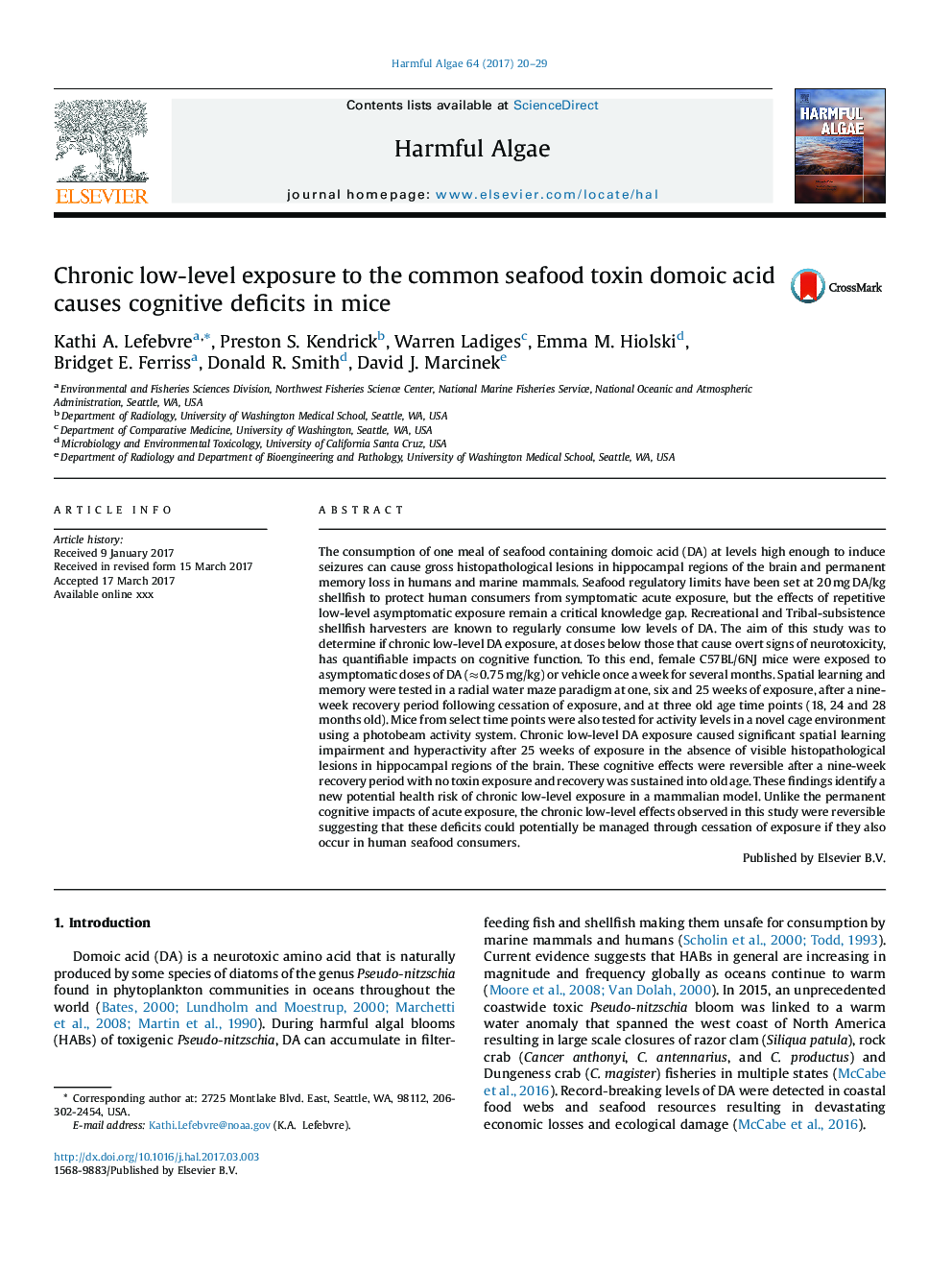| کد مقاله | کد نشریه | سال انتشار | مقاله انگلیسی | نسخه تمام متن |
|---|---|---|---|---|
| 5765741 | 1626908 | 2017 | 10 صفحه PDF | دانلود رایگان |
عنوان انگلیسی مقاله ISI
Chronic low-level exposure to the common seafood toxin domoic acid causes cognitive deficits in mice
ترجمه فارسی عنوان
قرار گرفتن در معرض مضر در معرض خطر کم آبی غذاهای دریایی سم دویوک اسید باعث کمبود شناختی در موش می شود
دانلود مقاله + سفارش ترجمه
دانلود مقاله ISI انگلیسی
رایگان برای ایرانیان
موضوعات مرتبط
علوم زیستی و بیوفناوری
علوم کشاورزی و بیولوژیک
علوم آبزیان
چکیده انگلیسی
The consumption of one meal of seafood containing domoic acid (DA) at levels high enough to induce seizures can cause gross histopathological lesions in hippocampal regions of the brain and permanent memory loss in humans and marine mammals. Seafood regulatory limits have been set at 20 mg DA/kg shellfish to protect human consumers from symptomatic acute exposure, but the effects of repetitive low-level asymptomatic exposure remain a critical knowledge gap. Recreational and Tribal-subsistence shellfish harvesters are known to regularly consume low levels of DA. The aim of this study was to determine if chronic low-level DA exposure, at doses below those that cause overt signs of neurotoxicity, has quantifiable impacts on cognitive function. To this end, female C57BL/6NJ mice were exposed to asymptomatic doses of DA (â 0.75 mg/kg) or vehicle once a week for several months. Spatial learning and memory were tested in a radial water maze paradigm at one, six and 25 weeks of exposure, after a nine-week recovery period following cessation of exposure, and at three old age time points (18, 24 and 28 months old). Mice from select time points were also tested for activity levels in a novel cage environment using a photobeam activity system. Chronic low-level DA exposure caused significant spatial learning impairment and hyperactivity after 25 weeks of exposure in the absence of visible histopathological lesions in hippocampal regions of the brain. These cognitive effects were reversible after a nine-week recovery period with no toxin exposure and recovery was sustained into old age. These findings identify a new potential health risk of chronic low-level exposure in a mammalian model. Unlike the permanent cognitive impacts of acute exposure, the chronic low-level effects observed in this study were reversible suggesting that these deficits could potentially be managed through cessation of exposure if they also occur in human seafood consumers.
ناشر
Database: Elsevier - ScienceDirect (ساینس دایرکت)
Journal: Harmful Algae - Volume 64, April 2017, Pages 20-29
Journal: Harmful Algae - Volume 64, April 2017, Pages 20-29
نویسندگان
Kathi A. Lefebvre, Preston S. Kendrick, Warren Ladiges, Emma M. Hiolski, Bridget E. Ferriss, Donald R. Smith, David J. Marcinek,
